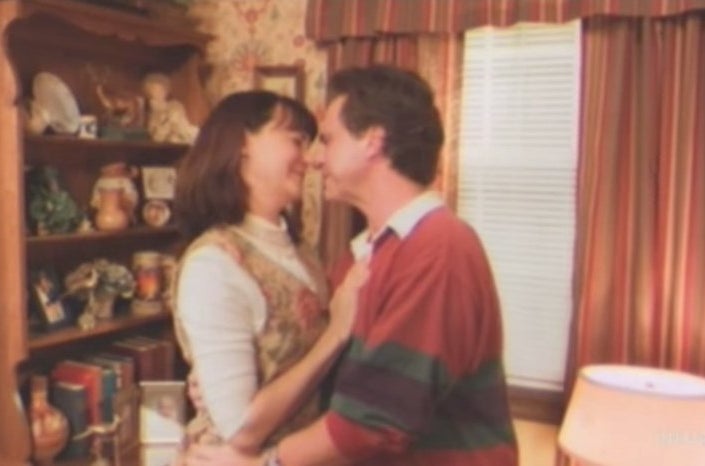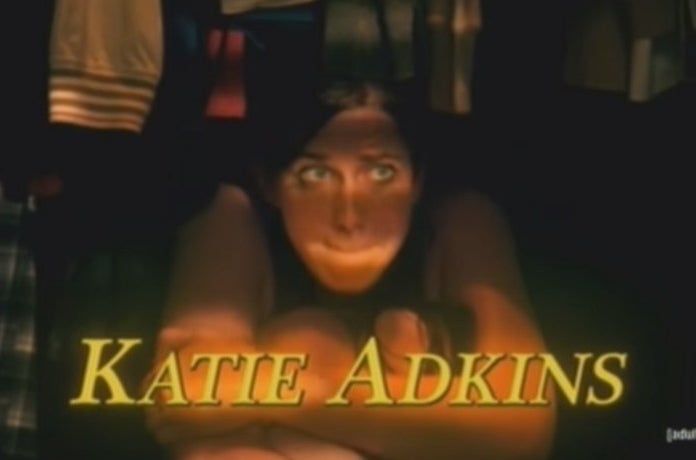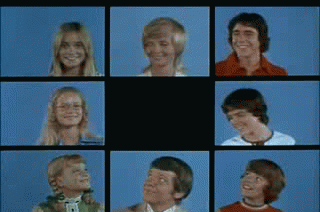

Shots from Adult Swim's "Too Many Cooks" — as the tone established descends into something dark and Lynchian.
"Too Many Cooks" began as an Adult Swim parody that aired on Cartoon Network's late-night block for a week or so at the end of October, but since then, the surreal and twisted 11-minute video has gone viral in a way that even its creators, Chris "Casper" Kelly (Squidbillies) and Paul Painter, have been gobsmacked by. What is it about this short that has exerted such a magnetic pull on so many?
"Too Many Cooks" is, on the surface, initially a parody of 1970s and 1980s sitcoms that once populated the television landscape. These are the types of shows you might recall watching from the couch of your grandparents' house, shows like The Brady Bunch, Three's Company, Family Matters, and Perfect Strangers with their familiar theme songs and title sequences, once hallmarks of the sitcom form. They're insidiously comfortable in a way; it's often impossible to watch just one of these. Networks wisely capitalized on this, building entire programming blocks around anodyne shows — many of which were family comedies — that were, in their ways, almost identical to one another. There's a setup, a beat, a punch line. Cue the laugh track and pause. There's a cheer when a beloved character enters the room, an audible and predictable reaction whenever a character kisses another or when a character gets in trouble or puts another in their place.
This is the communal language of television; we all know and understand these cues instinctively — know when to laugh, when to grimace, when to cheer. On "Too Many Cooks," it may not be exactly Family Matters or Perfect Strangers that you're reminded of, but an infinite number of other, similarly structured sitcoms that are recognizable callbacks to a very different time in comedies. It's a conceptual lure, rather than a specific one, that "Too Many Cooks" casts out, capturing an era before the rise of single-cams and the eradication of theme songs and title sequences. It was still a time where everybody knew your name and, as the song tells us, they were always glad you came. Where the actors would stop what they were doing and look up and smile at the camera, a literal welcome to the viewer, a psychological semaphore waving right at you, the actor's name emblazoned in yellow beneath their toothy glare. Because it's part of our pop culture DNA, we know instinctively what this signals and what it represents. It is pure bubble gum nostalgia, saccharine and devoid of calories, and that look of false acknowledgement toward the viewer makes us complicit in what it's selling.


The opening credits for The Brady Bunch and Family Matters.
Which is why it's interesting that "Too Many Cooks" aired during Adult Swim's 4 a.m. block, which has hosted a number of fake infomercials, those ubiquitous and vapid marketing exercises that stoners and insomniacs love-hate in their own ways, recalling the very archetypes that Western civilization holds as precious. Highly unnecessary junk is dressed up as something essential and vital as perfect families gather around the dinner table to eat baked potatoes and steak cooked with improbable gadgets. It's a hairbrush that holds an iPhone. Or a food dehydrator. Or an exercise tool that's guaranteed to make you lose weight and regain your sexual attractiveness. You need this, they whisper.
In their own way, sitcoms sold the very idealized version of the families gathered in these infomercials, actors pretending that the laughter and smiles around the hearth — or the breakfast table or exercise room or whatever — are genuine. This isn't your family, they assert; they're better than your family. They're perfect families, their problems always solved in 30 minutes, their issues reduced to familiar tropes punctuated by guffaws.
And so "Too Many Cooks" takes this setup — the familiar title sequence, those yellow actor names, the trite adage masquerading as a punny title — and subverts the form and the audience expectations. A family comedy using the title and theme song morphs into a black family comedy into a cop drama into a G.I. Joe cartoon into a cheesy sci-fi space opera (C.O.O.K.S. "defending humanity" against B.R.O.T.H.) into a medical drama ad infinitum, recycling and reusing archetypes we've seen a thousand times. But the sketch is more than just playing with these forms; it quickly becomes darker, more surreal (Lars von Trier as "Pie"), and more malevolent. That happy couple now kisses other lovers, that sexy neighbor is now always topless, and that adorable cat is now bleeding as it attempts to crawl, painfully, across the kitchen floor. This, Kelly seems to say, is not what you expected or craved — it is going to take your nostalgia and smash it into a billion pieces.
View this video on YouTube
The opening credits to Perfect Strangers.
"Too Many Cooks" moves into a true Lynchian mode, piling up bodies among an eerily distorted soundtrack, blood and guts flying everywhere, a psycho cannibal (William Tokarsky) playing all of the roles before eating body parts he takes out of the oven. He then stalks and murders a woman after she attempts to hide in the closet. It's an archetype of a different sort, a horror flick designed to prey on our primal fears that nonetheless pokes fun at the sitcom setup as a female actor's name follows her wherever she runs. Hiding in the closet, behind a folding slatted door, she's given away by the warm glow of those yellow letters, a glow that is meant to unconsciously remind us of the light from the television set.
But it's not just the woman who is being slain here, even as the red emergency button is pushed and the terror of the slasher plot is jettisoned. "Too Many Cooks" wants to destroy our collective nostalgia for this form altogether. It holds up the 1980s sitcom as something worth celebrating but finds it as hollow as the products that those infomercials are peddling. They're unnecessary and empty, they're relics of a time that we long for but shouldn't return to. In fact, we shouldn't try. The collection of assembled cast members at the end, all smiling happily for the camera, isn't the actual ending; it's a fiction predicated on our own psychological need to see our best selves reflected on screen, to see the sitcom triumph over the harshness and horror of the killer. But he's there at the very end, worming his way into the extended family portrait, his head remaining on screen even after everything else vanishes into the darkness. Fade to black.
The split-second show that follows uses the all-too-familiar refrain of a man entering the front door and bellowing, "Honey, I'm home," an ur-sitcom staple, before the laugh track rings out and the end credits roll. It reduces the sitcom to its barest element, the setup, the gag, the most tired joke line of all joke lines. There are reasons why television moved past this format and these archetypes, why our comedies today — or at least the more intelligent ones — strive for more than just pratfalls and laugh tracks. And, consequently, there are reasons why the form idealized and then ultimately cast off by "Too Many Cooks" reminds us of something distant and dusty from our childhoods or adolescence. In exploiting those forms, Kelly and "Too Many Cooks" point toward the danger of nostalgia, which might have the power to tug on your heartstrings, but also to rip them right out of your chest.
Watch the full 11-minute "Too Many Cooks" here:
View this video on YouTube
The psycho killer is played by William Tokarsky. An earlier version of this post misstated the actor.


